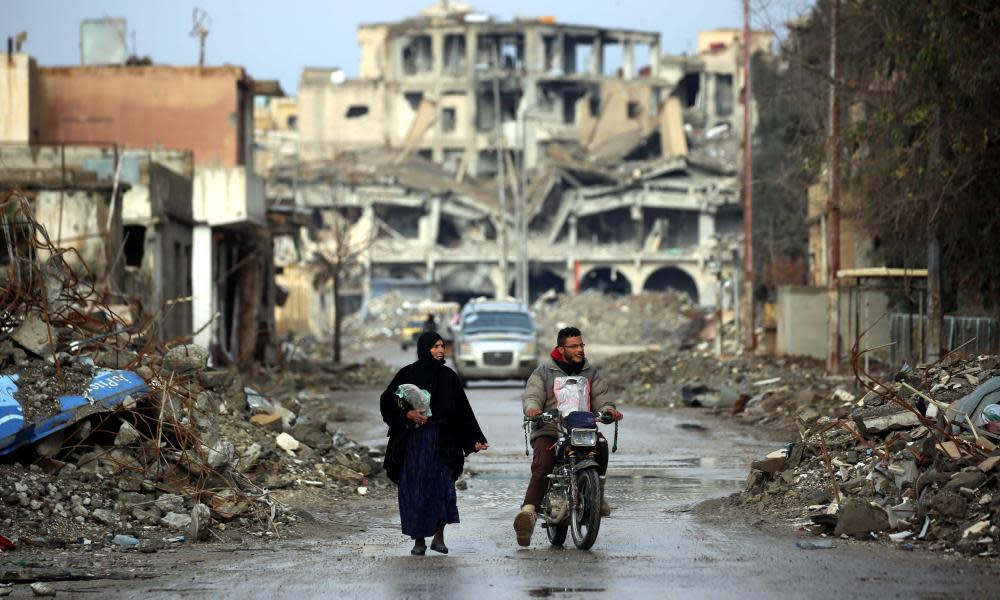UK revives aid scheme halted over alleged payments to Syrian jihadists

The government has resurrected a controversial multimillion-pound aid scheme to train a civilian police force that was alleged to have given cash to extremists in Syria, the Guardian can reveal.
The UK-backed project was suspended in November last year, after an investigation found that the Free Syrian Police were paying off militants, listing dead and fictitious people on their payroll, and working with courts engaged in human rights abuses.
The Foreign and Commonwealth Office and Adam Smith International (ASI), the British contractor running the project since 2014, both launched immediate internal and third-party investigations into the allegations by the BBC Panorama report Jihadis You Pay For.
Yet just five weeks later, the access to the justice and community security scheme (Ajacs) was fully reinstated, the Guardian has discovered, prompting concerns about the depth and scope of the audits.
In a letter to Kate Osamor, shadow secretary of state for international development, Foreign Secretary Boris Johnson said: “Having investigated these allegations we are clear that neither the government nor ASI has been involved in any wrongdoing.
“The allegations made by Panorama are either untrue, misleading or refer to incidents that we were aware of but took action on at the time,” wrote Johnson.
Yet Osamor, who showed the letter to the Guardian, expressed concern over the depth of the government’s investigation, amid further revelations that the FCO did not ask the BBC to see any evidence or speak to any of its sources.
In an exclusive statement to the Guardian, the BBC said: “The allegations in Jihadis You Pay For were based largely on ASI’s own internal documents and were supported by the testimony of numerous sources. It is disappointing that the FCO did not approach us during their own investigation to speak to us, ask for further detail, or look at any of the source material we had uncovered.”
Osamor told the Guardian: “If true, it beggars belief that Boris Johnson would ignore dossiers of evidence from the national broadcaster’s top investigative journalism programme in their supposedly exhaustive investigation.
“The foreign secretary must now set out clearly what steps his department takes to investigate when aid spending goes wrong. The Foreign and Commonwealth Office lacks the Department for International Development’s world class aid effectiveness and transparency standards, and needs to rapidly get up to speed, or risk having its part of the aid budget frozen.”
The news that the programme has been reinstated comes at a time of increased scrutiny of foreign aid programmes, following reports of sexual misconduct and harassment by UN and charity officials, including Oxfam.
Nick Dearden, director of Global Justice Now, said it was “outrageous that this contract has been reinstated so soon”.
“After Panorama, the government rightly froze this contract. Now that the spotlight is off, Boris Johnson has apparently reinstated it without explaining to the public what investigation took place,” Dearden said.
Adam Smith International said in a separate statement: “When alerted to the Panorama programme, ASI immediately launched investigations – both intensive internal research into each of Panorama’s allegations, and an independent inquiry led by external legal counsel. This extensive research … found that all allegations were either false, or there was mitigating context. Donors also conducted an inquiry that found Panorama presented no information that they had not already known.”
A spokeswoman added, “Where anything went amiss, it was properly addressed and drawn to donors’ attention at the time. The scale to which these errors occurred was astonishingly low given the environment in which the project is operating.”
ASI came under fire last year after a special report by the International Development Committee had raised “serious concerns about the culture” of the company and “deplored” its “entirely inappropriate” actions.
The government froze contracts with the company, which has been granted £450m in development funding since 2011, early last year over its ethical integrity – a move that was later rebranded as ASI’s “voluntary withdrawal”. Yet the Guardian can confirm that ASI has submitted tenders for new contracts with the FCO and the Department for International Development (DfID), following a “fundamental review of corporate governance” and implementation of new policies regarding governance and ethical conduct, according to an ASI statement sent to the Guardian.
Dearden said: “The current aid charity scandal must not be an excuse to accelerate the privatisation of aid, which delivers worse outcomes for the world’s poorest people. The UK government must end its obsession with contracting out its responsibilities in order to bolster big business profits. This doesn’t mean that we should reduce the aid budget, but it needs to be spent differently.
“Helping build public health and education systems around the world is as important as building them here, but handing contracts to businesses which push disastrous free market policies like privatisation and liberalisation on developing countries clearly must stop.”
Osamor has called for further inquiries into the conflict, stability and security fund, which is partly funded by aid money to tackle conflict and build security overseas.
“I am also calling for a full forensic investigation and line-by-line review of the controversial and opaque conflict, stability and security fund, across all 70 countries. That must be independent, and must command the trust of parliament – rather than just taking the foreign secretary at his word,” she said.

 Yahoo News
Yahoo News 
